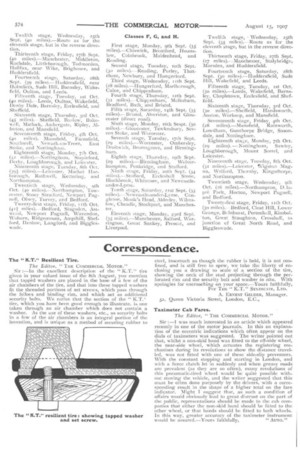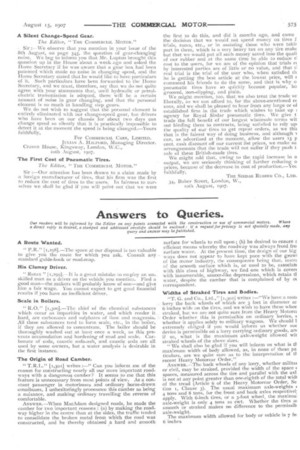Correspondence.
Page 18

Page 19

If you've noticed an error in this article please click here to report it so we can fix it.
The " K.T." Resilient Tire.
The Editor, "THE COMMERCIAL MOTOR."
Sir :—In the excellent description of the " K.T." tire given in your valued issue of the 8th August, you mention that tapped washers are placed in the base of a few of the air chambers of the tire, and that into these tapped washers fit the threaded portions of set screws, which pass through the felloes and binding rim, arid which act as additional security bolts. We notice that the section of the " tire, which you have been good enough to illustrate, is one taken through an air chamber which does not contain a washer. As the use of these washers, etc., as security bolts in a few of the air chambers is an integral portion of the invention, and is unique as a method of securing rubber to
steel, insomuch as though the rubber is held, it is not confined, and is still free to spew, we take the liberty of enclosing you a drawing to scale of a section of the tire, showing the neck of the stud projecting through the perforated rim and the security bolt and washer in situ. With apologies for encroaching on your space.—Yours faithfully, For THE " K.T." SYNDICATE, LTD. A. ERNEST GELDER, Manager. 52, Queen Victoria Street, London, E.G., Taximeter Cab Pares.
The Editor, "THE COMMERCIAL MOTOR."
Sir :—I was much interested in an article which appeared recently in one of the motor journals. In this an explanation of the eccentric indications which often appear on the dials of taximeters was suggested. The writer pointed out that, whilst a non-skid band was fitted to the off-side wheel, the near-side wheel, which actuates the registering mechanism during its revolutions to show the distance travelled, was not fitted with one of these side-slip preventers. With the constant stopping and starting in London, and with a fierce clutch let in suddenly and when greasy roads are prevalent (as they are so often), many revolutions of this pneumatic-tired wheel would be quite possible without moving the vehicle, and the writer suggested that this must be often done purposely by the drivers, with a corresponding result in the shape of a higher total on the fare indicator. Might I suggest that, as such a condition of affairs would obviously lead to great distrust on the part of the public, representations should be made to the cab companies that either the non-skid band should be fitted to the other wheel, or that bands should be fitted to both wheels. In this way, greater accuracy of the taximeter instrument would be assured.—Yours faithfully, "AUTO."
A Silent Change-Speed Gear.
The Editoy, TUE ComMERCIAL MOTOR."
Sir :-We observe that you mention in your issue of the Sth August, on page 545, the question of gear-changing noise. We beg to inform you that Mr. Lupton brought this question up in the House about a week ago and asked the Home Secretary if he was aware that a gear box had been patented which made no noise in changing speed, and the Home Secretary stated that he would like to have particulars of it. Such particulars have been forwarded td the Home Secretary, and we must, therefore, say that we do not quite agree with your statements that, until hydraulic or petrolelectric transmission is adopted, there will be a eertain amount of noise in gear changing, and that the personal element is so much in handling step gears. We do not wish to suggest that the personal element is entirely eliminated with our change-speed gear, but drivers who have been on our chassis for about two days can change speed so silently that it is practically impossible to detect it at the moment the speed is being changed.—Yours faithfully,
For ComMERCiAL CARS, LIMITED. JULIAN A. HALFORD, Managing Director. Craven House, Kingsway, London, W.C., xoth August, 1907.
The First Cost of Pneumatic Tires.
The Editor, "THE COMMERCIAL MOTOR."
Sir :—Our attention has been drawn to a claim made by a foreign manufacturer of tires, that his firm was the first to reduce the cost of tires to the users. In fairness to ourselves we shall be glad if you will point out that we were the first to do this, and did it months ago, and came the decision that we would not spend money on tires trials, races, etc., or in assisting those who were takir part in them, which is a very heavy tax on any tire mak( but that we would put all such money saved into the quail of our rubber and at the same time be able to reduce tl cost to the users, for we are of the opinion that trials ri by interested parties are of little or no value, and that ti real trial is the trial of the user who when satisfied th he is getting the best article at the lowest price, will r commend his friends to do the same, and that is why o pneumatic tires have so quickly become popular, bo grooved, non-slipping, and plain. We might mention, too, that we also treat the trade ve liberally, as we can afford to, for the above-mentioned re sons, and we shall be pleased to hear from any large or ol established firm in the trade which wishes to take up agency for Royal Sirclar pneumatic tires. We give t trade the full benefit of our largest wholesale terms wit out binding them to contracts, being satisfied to rely up' the quality of our tires to get repeat orders, as we thit that is the fairest way of doing business, and although can, as advertised at the moment, allow the users 15 p cent. cash discount off our current list prices, we make su arrangements that the trade will not suffer if they push t sale of these British-made tires.
We might add that, owing to the rapid increase in o output, we are seriously thinking of further reducing o prices, because of the decrease in cost of production.—You faithfully,
Tim SIRDAR RUBI3ER CO., LTD. 34, Baker Street, London, W.,
loth August, 1907.
























